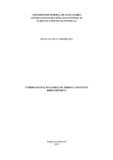| dc.contributor.advisor | Andreatta, Tanice | |
| dc.creator | Rodrigues, Sintia da Silva | |
| dc.date.accessioned | 2021-05-13T14:07:40Z | |
| dc.date.available | 2021-05-13T14:07:40Z | |
| dc.date.issued | 2019-07-08 | |
| dc.date.submitted | 2019 | |
| dc.identifier.uri | http://repositorio.ufsm.br/handle/1/20885 | |
| dc.description | Trabalho de conclusão de curso (graduação) – Universidade Federal de Santa Maria, Centro de Tecnologia, Curso de Ciências Econômicas, RS, 2019. | por |
| dc.description.abstract | The global marketing land has become one of the most debated issues in recent years. In this context issues such as food security, water use, property rights and national sovereignty have become important issues when the subject is Land Grabbing. The aim of this work was to analyze the scientific literature on the subject of land grabbing. The method consisted of a bibliometric revision, in which the metrics extracted from the digital platform Scopus and JCR were used. Methodi Ordinatio was used to perform the ranking of the most relevant articles, considering the period from 2010 to January 2019. Through the UCINET Software, the configuration of networks among authors, co-authors and / or universities was analyzed. The search revealed an arrangement of 517 documents found in the database Scopus. Highlights as the United States, for the article with the greatest impact factor the Global land and water grabbing. Land grabbing has brought a great deal of research and debate over the last few years, but there is no consensus on the effects of land marketing for foreigners. There is still much to discuss about this phenomenon that is growing more and more, leaving doubts about its effects and intentions in society. | eng |
| dc.language | por | por |
| dc.publisher | Universidade Federal de Santa Maria | por |
| dc.rights | Acesso Aberto | por |
| dc.rights | Attribution-NonCommercial-NoDerivatives 4.0 International | * |
| dc.rights.uri | http://creativecommons.org/licenses/by-nc-nd/4.0/ | * |
| dc.subject | Land grabbing | por |
| dc.subject | Comercialização | por |
| dc.subject | Terras | por |
| dc.subject | Soberania nacional | por |
| dc.subject | Água | por |
| dc.subject | Land Grabbing | eng |
| dc.subject | Marketing | eng |
| dc.subject | Lands | eng |
| dc.subject | National sovereignty | eng |
| dc.subject | Water | eng |
| dc.title | Comercialização global de terras: um estudo bibliométrico | por |
| dc.type | Trabalho de Conclusão de Curso de Graduação | por |
| dc.degree.local | Palmeira das Missões, RS, Brasil | por |
| dc.degree.graduation | Curso de Ciências Econômicas | por |
| dc.description.resumo | A comercialização global de terras tem se tornado um dos assuntos mais debatidos no campo científico social e econômico. Neste contexto questões como segurança alimentar, uso da água, direito de propriedade e a soberania nacional tornaram-se assuntos de importância quando o assunto tratado é o Land Grabbing. Teve-se como objetivo realizar uma análise da literatura relacionada à temática do “Land Grabbing”. O método consistiu em uma revisão bibliométrica, em que se utilizaram as métricas extraídas da plataforma digital Scopus e JCR. Foi utilizado o Methodi Ordinatio para realização do ranking dos artigos mais relevantes, considerou-se o período de 2010 a janeiro de 2019. Por intermédio do Software UCINET analisou-se a configuração de redes entre autores, coautores e/ou universidades. O estudo obteve um arranjo de 517 documentos encontrados na base de dados Scopus. Destaques como país os Estados Unidos, para o artigo com maior fator de impacto o Global land and water grabbing. O tema Land Grabbing trouxe nos últimos anos uma grande quantidade de pesquisas e debates sobre este assunto. No entanto não há um consenso sobre os efeitos da comercialização de terras para estrangeiros. Ainda, há muito que se discutir sobre este fenômeno que está crescendo cada vez mais, deixando dúvidas sobre seus efeitos e intenções na sociedade. | por |
| dc.publisher.country | Brasil | por |
| dc.publisher.initials | UFSM | por |
| dc.subject.cnpq | CNPQ::CIENCIAS SOCIAIS APLICADAS::ECONOMIA | por |
| dc.publisher.unidade | UFSM Palmeira das Missões | por |



